Edition 54: May 2022
-
Helpful contacts
Employee Assistance Program: 1800 099 444
Nurse & Midwife Support: 1800 667 877
Nurse & Midwife Health Program:
03 9415 7551 or 1800 888 236 -
Upcoming Dates
May 2022
5 International Day of the Midwife
12 International Nurses Day
17 IDAHOBIT (International Day Against Homophobia, Biphobia and Transphobia)
18 Women’s Giving Circle Program expressions of interest close
26 National Sorry Day
27 Commencement of National Reconciliation Week
31 Deadline for nursing and midwifery registration (to avoid late fee) -
The Nursing & Midwifery Executive
Adjunct Professor Shane Crowe
Executive Director of Nursing & Midwifery
Phone: 8345 1463
Email: shane.crowe@wh.org.auAllison Lamb
Acting Director of Nursing & Midwifery, Williamstown Hospital
Division: Aged Cancer and Continuing Care
Phone: 0421 950 501
Email: allison.lamb@wh.org.auProfessor Bodil Rasmussen
Chair of Nursing, Deakin University/Western Health
Phone: 8395 8163
Email: bodil.rasmussen@wh.org.auDoug Mill
Director of Nursing & Midwifery
Divisions: Chronic & Complex Care, Drug Health
Phone: 8345 1916
Email: douglas.mill@wh.orh.auHelen Sinnott
Director of Nursing & Midwifery, Sunshine
Divisions: Women’s & Children’s, Clinical Support & Specialist Clinics
Phone: 0435 962 716
Email: helen.sinnott@wh.org.auJo Mapes
Director of Nursing & Midwifery, Footscray Hospital
Division: Perioperative and Critical Care
Phone: 0423 302 337
Email: joanne.mapes@wh.org.auKate Renzenbrink
Director of Nursing & Midwifery Informatics (CNMIO)
Phone: 0425 772 324
Email: kate.renzenbrink@wh.org.auProfessor Linda Sweet
Chair of Midwifery, Deakin University/Western Health
Phone: 8395 1178
Email: linda.sweet@wh.org.auLisa Gatzonis
Director of Nursing & Midwifery Workforce
Phone: 9393 0127
Email: lisa.gatzonis@wh.org.auMandy Cullen
Acting Director of Nursing, Melton Health
Phone: 0413 867 065
Email: MandyCu@djhs.org.auNicole Davies
Director of Nursing & Midwifery, Sunbury Day Hospital
Division: Emergency, Medicine & Access, Western PHU
Phone: 9732 8630
Email: nicole.davies@wh.org.auRohan Vaughan
Director of Nursing, Bacchus March Hospital
Phone: 0434 365 769
Email: rohan.vaughan@wh.org.auSue Sweeney
Director of Midwifery Practice
Phone: 0466 801 447
Email: sue.sweeney@wh.org.auAssociate Professor Tony McGillion
Director of Nursing & Midwifery (Inspiring Innovation)
Phone: 0466 925 108
Email: tony.mcgillion@wh.org.au
From Shane
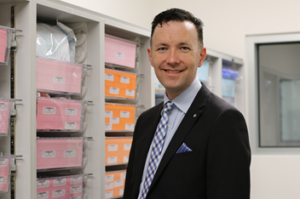
This month Western Health will welcome our next cohort of early career nurses and midwives as they commence their Graduate Program. We have 90 new graduate nurses and 20 new gradate midwives commencing. Unfortunately there are widespread workforce challenges in healthcare across the country, and it is wonderful to have these new colleagues join Western Health and become part of our team. I am sure that you will all make them feel very welcome, help them to get settled in quickly and ensure they are supported to make a successful transition from student to healthcare professional.
During May we celebrate both the International Day of the Midwife on 5 May and International Nurses Day on 12 May, which are opportunities to recogise the impact that the professions have on the community. Please join in our virtual choir to help celebrate these important day. We will also be holding a celebration event on 12 May, which will include some surprises.
The theme for International Nurses Day this year is Nurses: A Voice to Lead – Invest in nursing and respect rights to secure global health, which focuses on the need to invest in nursing and respect the rights of nurses in order to build resilient, high quality health systems to meet the needs of individuals and communities now and into the future. The theme of the International Day of the Midwife is Midwives: 100 years of Progress which celebrates the 100th anniversary of the International Confederation of Midwives and the accomplishments of midwives around the world.
I continue to be so proud and humbled by the amazing efforts of our nurses and midwives, in the way that you have provided Best Care to our community through significant and evolving adversity. You have shared your skills, knowledge, expertise and kindness when they have needed us most, and you will be remembered by your patients and women for a long time after they leave us. I am also so inspired by how you have really cared for each other, and been kind to your colleagues through the tough times. We are team based professions – teamwork, camaraderie, kindness and care are central to our professions, are these professional values are core strengths. Working together you have been truly remarkable.
Words cannot express how grateful I am for everything that you do every day. With each action and interaction you truly do make a tangible positive difference. I want to sincerely thank all our nurses and midwives for your tireless work, professionalism, adaptability, creativity and endurance that you continually demonstrate.
Finally, a reminder this this month you also need to renew your registration. I encourage you to do this as soon as possible to avoid the late fee.
Shane Crowe
Executive Director, Nursing & Midwifery
Celebrating our nurses and midwives through song
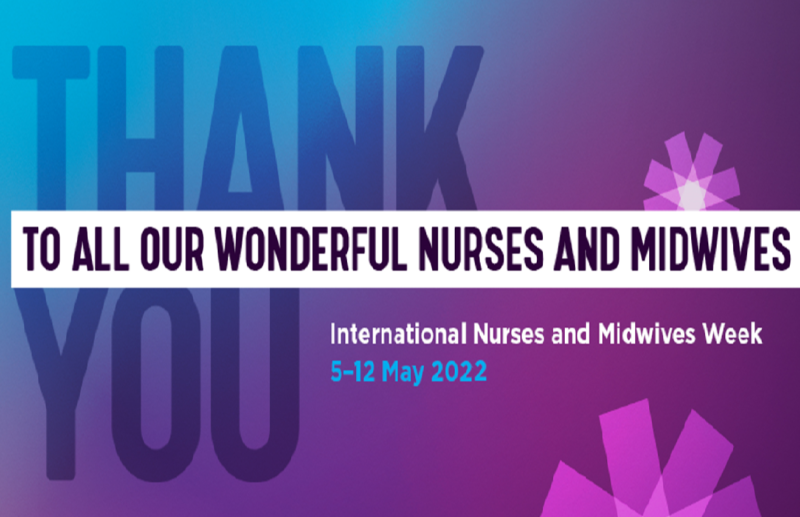
In the lead up to the International Day of the Midwife and International Nurses Day, Western Health will be celebrating our nurses and midwives with a unique shared experience that is keeping with this years’ theme.
So how are we celebrating?
Warm up your vocal chords and have some fun with your colleagues and submit a Couch Choir video.
What is Couch Choir?
Couch choir commenced as a very special project during the pandemic to allow people to sing safely during quarantine. It was established by the same team that host Pub Choir across Australia.
An example of a couch choir video: https://youtu.be/kGbSoDO1WSE
Western Health has engaged with Couch Choir so we can make our very own video to the theme song “I’ll be there for you” from the television show Friends.
You and your colleagues get to watch and sing along to the special made instructional videos. Record and submit your video. The Couch Choir team will do the rest and pull all the videos together into one Western Health Nurses and Midwives Choir video.
How do I participate?
Please follow the link to find the intro and instructional videos https://couchchoir.com/westernhealth
The intro video walks through everything involved.
Please remember that this is not about perfection, it’s about collaboration! It’s all about working together as a whole.
Your voice is good enough! Your video will be included, but your voice will be part of the choir – so no one will hear you singing by yourself. Couch Choir do not keep your submissions once the project is completed.
Once you are comfortable and ready to record, film yourself singing the ‘Melody’ and a ‘Harmony’ on your phone in landscape mode, save the file, and upload your submission at the buttons at the bottom of the website. You can upload your video by yourself or as a small group.
The video will be presented as part of our planned event on 12 May 2022 to celebrate Western Health Nurses and Midwives! More details to come on this event and how we will mark these important days.
Better to Call than Fall
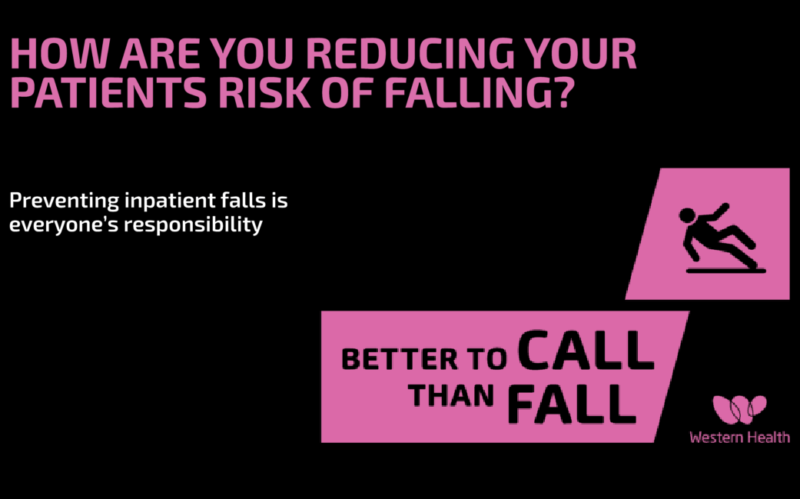
The new Western Health Falls Improvement Plan 2021-22 was launched on 27 April 2022 to guide our efforts in reducing the instances of falls and related injuries sustained during in-patient hospital stays.
Falls can be devastating to patients – often resulting in injury, longer hospital stays and a loss of independence, particularly for older patients. Unfortunately, despite having many of the traditional falls prevention measures in place across our hospitals, our rate of falls and falls with injury has remained stubbornly high and has worsened throughout the COVID-19 pandemic.
In response to these comparatively high rates of falls and falls injuries across Western Health, the Executive established a Falls Taskforce in late 2020 to oversee the development and implementation of a new Falls Improvement Plan. The taskforce conducted a gap analysis against best practice, reviewed data trends, engaged multidisciplinary teams to generate strategies to ensure sustainable solutions and formed four sub-groups focusing on consumer participation, governance, equipment and the environment, and clinical practice education.
The Falls Improvement Plan brings this work together and outlines new clinical guidance and practice that aims to reduce patient falls and improve patient outcomes. These include:
- Improved risk assessments that identify each patient’s specific falls risk factors, and implement linked strategies to reduce the risk
- Single risk assessment completed by nurse, and reviewed by the MDT, ensuring accurate assessment and appropriate interventions
- Falls Champion Program to support local sustainability of initiatives
- New Falls Prevention and Management WeLearn education module for clinicians
- Comprehensive falls prevention and management intranet page with links to all information, education resources, training video, and equipment purchasing details
- Access to evidence-based falls prevention equipment
- Patient information to support education and learning for our patients and families
- Comprehensive falls prevention and management PPG
- New documentation tools in the EMR including post-fall management templates, ward overview page, and post-fall order sets.
To encourage engagement with the new Falls Improvement Plan, we have prizes for the first three departments to fully complete the Falls Prevention and Management module on WeLearn. Prizes are gift vouchers for $500, $250 and $100 for first, second and third placed respectively. Highest completion rate of the WeLearn Package winners will be announced on 30 June.
All clinical staff are strongly encouraged to engage with the Falls Improvement Plan and work in partnership with our patients to challenge traditional practices, implement improvements and embrace innovations. Together, we can reduce falls in our hospitals and give our patients the best chance of a speedy recovery.
Flu Vax now mandatory
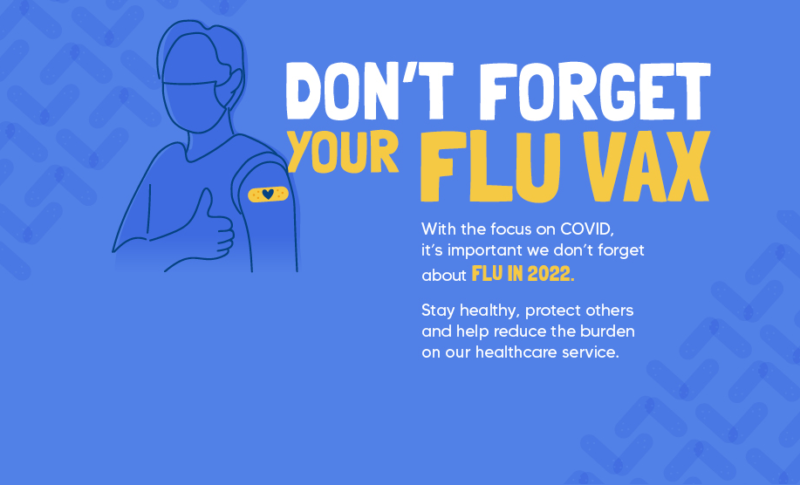 As an occupational group, healthcare workers are at increased risk of vaccine-preventable disease if not vaccinated. Additionally, if not vaccinated, healthcare workers may pose an increased risk of disease transmission to other workers and patients, particularly those who are vulnerable because of age, pregnancy, immunosuppression or chronic disease.
As an occupational group, healthcare workers are at increased risk of vaccine-preventable disease if not vaccinated. Additionally, if not vaccinated, healthcare workers may pose an increased risk of disease transmission to other workers and patients, particularly those who are vulnerable because of age, pregnancy, immunosuppression or chronic disease.
The introduction of mandatory vaccination of the influenza vaccination for Category A and Category B healthcare workers was recently announced by the Department of Health, and will be introduced this year. It will bring Victoria in line with other states and territories that have successfully introduced similar mandatory vaccination requirements.
Introducing mandatory vaccination of healthcare workers aims to:
- Reduce risks of vaccine-preventable disease for healthcare workers
- Mitigate the risk of transmission of vaccine-preventable diseases to patients
- Reduce workforce absence due to illness or quarantine.
Category A healthcare workers are those that have direct physical contact with patients, clients, deceased persons or body parts, blood, body substances, infectious material or surfaces or equipment that might contain these; or contact that might allow respiratory infections to be acquired or transmitted, for example workers with prolonged face-to-face contact with patients or clients or where their normal work is in a clinical area. Most Western Health nurses and midwives are in Category A.
Category B healthcare workers are those that work in patient areas who rarely have direct contact with blood or body substances. These employees may be exposed to infections spread by droplets, such as influenza.
Category A and B healthcare workers (current and newly commencing) are required to be vaccinated against seasonal influenza by 15 August 2022 and annually by 15 August each year following.
Please be advised that the 2022 Influenza Immunisation Program will be launched across Western Health on the following dates.
Western Health’s Flu Vax program:
All Western Health staff are eligible to get free Influenza Immuniation. Make sure to bring you Medicare card with you. If you don’t have your Medicare Card, we need your IHI number. Your vaccination will be delayed without your Medicare number.
The 2022 program has already been launched at Sunshine Hospital, Bacchus Marsh Hospital, Melton and Footscray Hospital.
Additional launch session are occurring:
- Footscray Hospital – Monday 2nd May
- Session Times :10:00 -15:30
- Location: McArthur Room
- Williamstown Hospital – Tuesday 3rd May
- Session Times: 10:00 -15:30
- Location: Ground Floor Sub Hub
- Sunbury – Wednesday 4th May
- Session Times: 10:00 -15:30
Following the launch days at the all sites, the program will be operational almost every day including weekends. For the coming months of May Nurse Immunisers will be available from 07:00 -22:15 hours.
Session times at various sites can be found on the Infection Prevention Calendar on the intranet webpage.
All staff who receive the vaccine elsewhere outside of Western Health must complete a Redcap survey, complete and attach your vaccination certificate available through your Medicare webpage.
To read more on Influenza and mandatory vaccination of healthcare workers update click here.
To read the Frequently Asked Questions on Influenza please click here.
Western Health takes out 2 Worksafe Awards
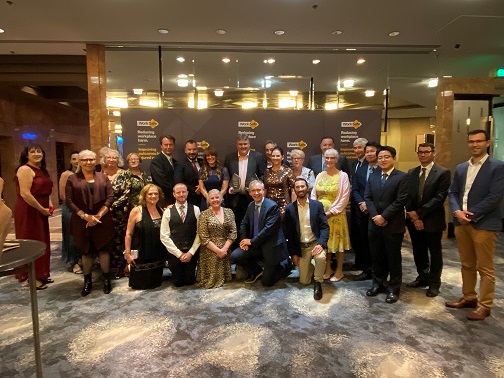
On 21 April 2022 Western Health scooped the pool at the annual Victorian Worksafe Awards.
These are statewide awards and finalists come from across Victoria and across any industry.
We were nominated for two awards:
- Commitment to Prevention of Mental Health Injury in the Workplace: Our nomination was for the wide range of strategies and actions we had taken around prevention of occupational violence and aggression. Known as the Predict. Prevent. Priority. Safety program, this work also included the implementation of the Behaviours of Concern chart and a range of other measures.
- Safety Solution of the Year: Our nomination (jointly with University of Melbourne) was for the ‘McMonty’ isolation hood, designed by A/Prof Forbes McGain in collaboration with a wonderful team from University of Melbourne Engineering.
In an unprecedented outcome, we won not one, but both of these major awards!
The most important aspect of these wins is that both were directly related to organisational efforts to support the safety of our staff and to prevent occupational violence and aggression in our workplace. Nothing is more important than that and this is why these awards were so gratefully received.
Both awards are an incredible acknowledgement of the huge amount of work the organisation has done to protect our people and to remain focused on this through the challenging two years of COVID.
We were up against extremely tough competition in the Awards and we were all very impressed with the magnificent safety initiatives that had been undertaken by our fellow finalists. The Awards, are statewide and open to all industries and sectors and this also applied to the categories we won.
Well done to the many staff involved in these fantastic initiatives.
Knowing Me, Knowing You with Safewards
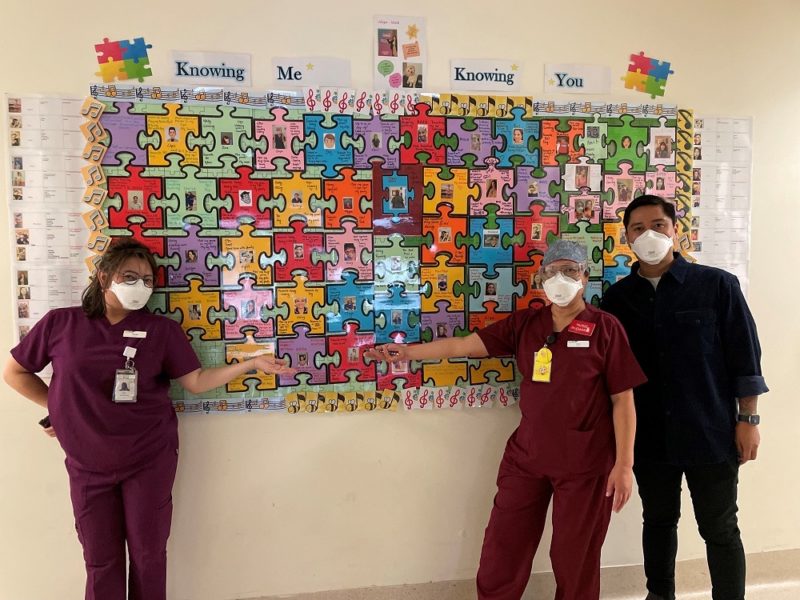
The Safewards in General Health Project initiative is being trialed in two wards (2A and 2F), supported by Safer Care Victoria and VMIA, and evaluated by Melbourne University.
The model and associated interventions aim to enable a better connection between staff, patients and family/loved ones, enhancing therapeutic relationships by introducing tools to reach this potential.
One of the first interventions being implemented is called Know Each Other, which builds rapport and connection by sharing fun facts as conversation starters and building a common sense of humanity. Ward 2A staff champions (pictured right) with great effort and pride have started a ‘Knowing Me, Knowing You’ board to share ‘Likes’ and ‘Most important things’ information to share about each other with patients and carers.
Safewards is part of Western Health’s strategy to decrease occupational violence and aggression, and complements the Predict. Prevent. Priority: Safety program. Well done to the Ward 2A and 2F teams.
JKWC awarded Baby Friendly Health Initiative accreditation
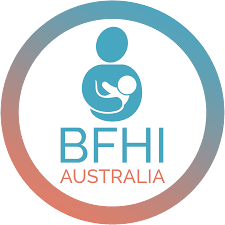
The Baby Friendly Health Initiative (BFHI) is a joint World Health Organisation (WHO) and UNICEF project that aims to create a healthcare environment where breastfeeding is the norm, and practices known to promote the well-being of all mothers and infants are promoted. The Ten Steps to Successful Breastfeeding are the global criteria against which maternity facilities are assessed and accredited to protect, promote and support breastfeeding.
The Baby Friendly hospitals framework supports maternity facilities to operate in a way that ensures all mothers and babies receive appropriate support and contemporary information in both the antenatal and postnatal period, regarding infant care and feeding.
Western Health maternity services at Joan Kirner Women’s & Children’s was recently granted BFHI accreditation through until the end of 2024. Only 26% of maternity services in Australia and 9 Victorian health services have been able to achieve BFHI accreditation, so Western Health is in a prestigious minority at the moment – we hope that that changes in the future.
Baby Friendly accreditation is a quality assurance measure that demonstrates a commitment to offer the highest standard of maternity care to mothers and babies. Attaining accreditation signifies that the facility is committed to evidence-based, best-practice maternity care and ensuring that every mother is supported with her informed choice of infant feeding during her transition to motherhood. The accreditation is reassessed every 3 years via a regular independent review.
Congratulations to our Lactation Consultants, our midwives and the wider maternity team on this fantastic achievement and for their ongoing commitment to providing Best Care to our women and babies.
Registration renewal time
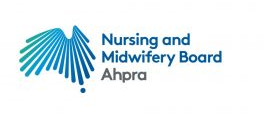
Nurses and midwives continue to play a leading role in the national effort against COVID-19. Importantly, registration renewal lets the public and your colleagues know that you’re still safe to practise.
To avoid a late fee renew online before 31 May 2022. All nurses and midwives needing to have renewed their registration prior to 30 June 2022 to allow them to continue to practise.
Western Health does not employ anyone into any nursing or midwifery position without an active registration for any period.
Payment:
To ensure quick and effective renewal, nurses and midwives and encouraged to renew online.
Renewal fees can be paid by credit/debit card. If you do not have a credit/debit card you can purchase a pre-paid debit card from various retail outlets for a nominal fee.
Ahpra has announced that they will no longer accept payment by BPAY.
Tips and information:
Read the renewal FAQs on the Ahpra website for helpful tips and more information on what you need to do to renew.
If you have difficulty renewing your registration online or you have a query about your registration, please contact Aphra by making a web enquiry or by calling 1300 419 495.
Infusion Pump Medication Safety Drug Library updated
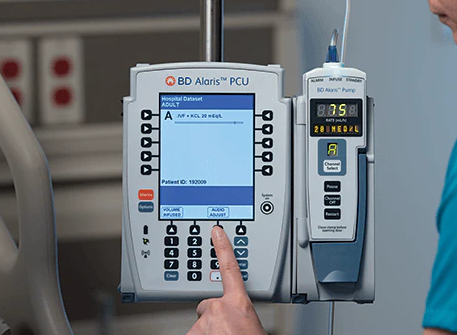
The medication safety drug library for Alaris PC Intravenous Infusion Pumps has been revised to incorporate several medication changes with medical, nursing and pharmacy consultation.
The new dataset, Western Health v5-5, was released via the wireless network on Monday, 2 May 2022 (at 7:30am). An infusion pump must be turned on for the dataset to be downloaded via the wireless network. You will need to allow 2-3 minutes for the new dataset to be downloaded.
Once the dataset has been downloaded (Wi-Fi light will stop flashing), switch the pump off.
The new dataset will be activated when the pump is next switched on and the user selects NEW patient.
Please ensure that all pumps in storage have the dataset activated via the above method and that the new dataset Western Health v5-5 is visible on pumps, before using it for any new patients. Your ward pharmacist can assist if required.
This update of the drug library is to:
- Add iron polymaltose continuous infusion to the Paediatric profile
- Add iron carboxymaltose intermittent infusion to the Paediatric profile
- Add lacosamide intermittent infusion to General Adult and ICU/Theatre profile
- Enabled Trimethoprim/Sulfamethoxazole, Bivalirudin, Frusemide 500mg/50mL, Glucagon, Insulin ICU, Potassium ICU, BP
Prothrombinex to be administered via the syringe module in the ICU/Theatre Profile.
For further information, contact Wei Hurn Soh, Senior Pharmacist – eMeds weihurn.soh@wh.org.au or Biomedical Engineering Services at your site.
Every Nurses Business: Building nursing capacity to care for people with intellectual disability and autism
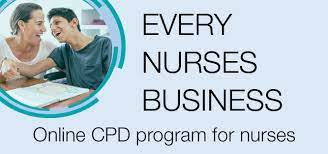
The Royal Commission into Violence, Abuse, Neglect and Exploitation of People with Disability has found there is a greater need for education and training for health professionals caring for people with cognitive disability, including those with intellectual disability and autism spectrum disorder.
The key gaps in education and training of health professions in relation to caring for people with cognitive disability was investigated and the key finding included:
- Inconsistency in curriculum of education providers;
- Lack of specific requirements on content relevant to health care providers providing safe and quality care for people with cognitive disability;
- Clinical placements do not adequately prepare students to care for people with cognitive disability and they are not consistently provided.
Mirroring these findings, a 2020 survey of 693 Australian Registered Nurse’s (RNs’) self-perceived comfort, confidence, and knowledge to care for people with intellectual disabilities and.or Autism Spectrum Disorder was extremely low (Cashin et al., 2021). Additionally, survey respondents reported very low levels of undergraduate content exposure, clinical placement, and continuing professional development (CPD) relevant to caring for this cohort.
Findings from this survey helped to inform the development of the Every Nurses’ Business free CPD program which aims to build RNs’ capacity to provide quality care for people with intellectual disability and/or autism spectrum disorder in mainstream health settings.
The development of the curriculum has included two project advisory groups: one of adults with lived experience of intellectual disability and/or autism spectrum disorder , and another of parents and carers.
Western Health nurses are encouraged to complete the Every Nurses’ Business free CPD program to help improve negative health outcomes and health disparity experienced by people with intellectual disability and/or autism spectrum disorder in our services. The program will shortly be added to WeLearn.
The program is separated into foundational, intermediate, and advanced levels of learning and opportunities to claim CPD hours throughout. It includes interactive content, videos, quizzes, and interviews with experts. Additionally, the advanced site offers synchronous learning sessions with experts in the field and opportunities to become a champion of change within the workplace.
Women’s Giving Circle Program expressions of interest open
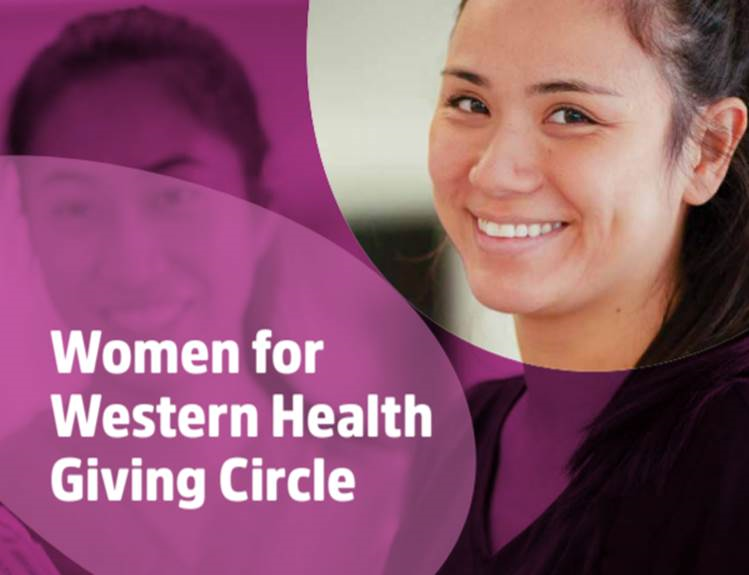
The Western Health Foundation have facilitated the establishment of the Western Health Women’s Giving Circle Program. This program has been made possible through the generous donations of the Giving Circle members, who take up an annual membership. The aim of this Giving Circle is to enable the members to be part of selecting the projects that receive funding. All donors to the program are invited to vote on how their funding is directed each year – ensuring that the impact of the collective gift is going toward something that they see as important and worthy of support.
In 2022, this program is able to offer a total grant of $57,000.00 for use by the successful applicant.
Expressions of Interest are now open and close on 18 May 2022.
Eligibility & Conditions of Application
- This application process is open to all Western Health employees
- Applicants must be available for the selection process including the pitch event in June and coaching and preparation beforehand
- Funding is non-recurrent and must be spent by May 2023
- Proposals must demonstrate an impact or benefit in line with Western Health’s strategic directions. The benefit must be achievable by May 2023
- Proposals must have appropriate support from within your division and must meet Western Health’s procurement, capital, employment or other policies and procedures.
Timeline and commitments
Applications Close on 18 May 2022, and finalists will be notified on 30 May 2022. The event and presentation will occur on 20 June 2022.
Successful applicants will be required to attend a briefing on 1 June and to participate in internal support and coaching leading up to the pitch and voting night. Applicants will be expected to deliver a prepared pitch and answer questions on their proposal by the members of the Giving Circle.
The winner of the grant will be advised on the voting night in June. It is expected that the successful applicant will be an ambassador for the Giving Circle program and will attend future events to discuss the progress of their work and its impact, and will take part in other publicity and social media communications through the Western Health Foundation.
Making texture modified food more appetising
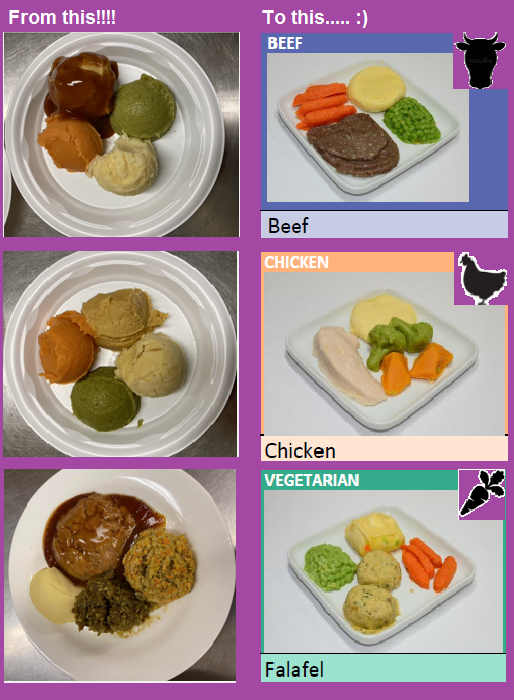
We all eat with our eyes as well as our mouths – if it doesn’t look good, we’re unlikely to eat it or enjoy it.
Approximately 15% of patients require texture modified foods. Textured modified diets are predominantly required due to swallowing problems, due to neurological conditions, post cancer treatment and post-surgical restrictions.
Until recently the textured modified food was currently served as unidentifiable scoops of food on a plate making them unappetising, unappealing with no variety and as you can see in the ‘before’ photos pictured right.
Added to this is the problem that pureeing foods dilutes nutrients making it difficult for patients to meet their nutritional requirements and the food is often inconsistent in texture, increasing the choking/aspiration risk for patients.
Put yourself in the patients shoes – could you eat this twice a day for every day of your admission? Little wonder over half is wasted.
Following the successful implementation of the Smooth Dining products at Williamstown Hospital the Food Services team recently expanded these products to both Sunshine Hospital and Footscray Hospital.
The new puree and minced meals:
- are shaped and taste like real food
- are made of 100% real food with no additives
- have the nutritional profile of non texture modified food
- still meets patient’s swallowing needs
- come with beef, fish, chicken, vegetarian and pork options, and allow patients to mix and match sauces for more variety
The pilot at Williamstown Hospital demonstrated that:
- Patients were happier with their meals , finding them more appetising.
- Patient ate 30% more of their meals and dietary requirements
- Consistent safe product for our patients
- Less wastage at all points
This initiative is improving food consistency, patient nutritional status and our patients’ meal experience during their inpatient stay.
Well done to the Food Services, Dietitians and Speech Pathology teams on this great change.
Benchmarking Best Care
The latest benchmark reports from the Health Roundtable that go up to September 2021 have recently been released, that show how our delivery of Best Care compares to other health services across Australasia.
In our continuing series looking at nursing and midwifery key performance indicators, this month we will look at how we perform in the area of hospital acquired infections. Hospital acquired infections include urinary tract infections, surgical site infection, pneumonia, blood stream infection, central line and peripheral line associated bloodstream infection, multi-resistant organisms, infection associated with prosthetics/implantable devices, gastrointestinal infections and other high impact infections.
Hospital Acquired Infections:
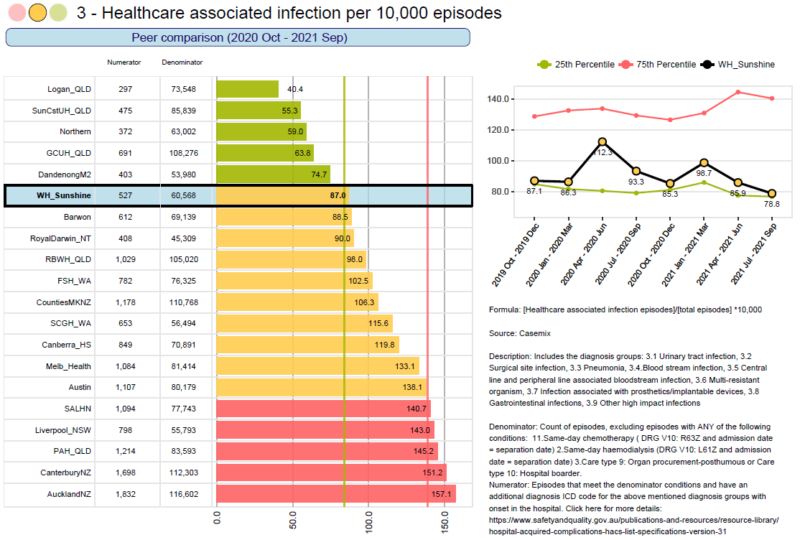
Sunshine Hospital
The rates of hospital acquired infections at Sunshine Hospital is in the low amber zone and has been trending downwards. This is a wonderful result.
Well done to our Sunshine Hospital teams.
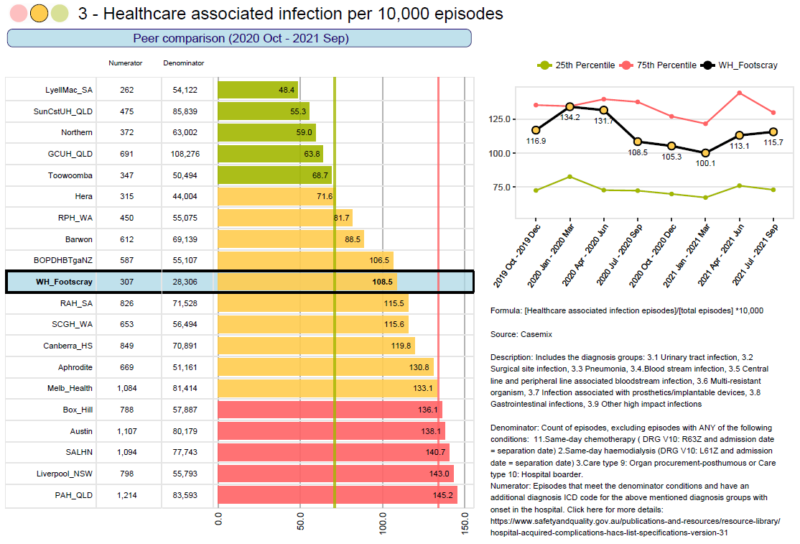
Footscray Hospital
Rates of hospital acquired infections at Footscray Hospital remains in the amber zone and has been relatively steady.
We are right in the middle of our peers, which means that our outcomes are acceptable, but there are opportunities for improvement.
You can impact these results through:
- Gloves should always be clean: gloves should always be changed between patients, and clean gloves are always required when undertaking any procedure. Hand hygiene is required between changes of gloves, and alcoholic hand rub must never be applied to gloves.
- Hand Hygiene: ensure you undertake the 5 moments of hand hygiene and that there is alcoholic hand rub present at every bed side and point of care.
- Correct skin preparation: whenever an invasive device is being inserted, chlorhexidine skin preparation must be utilised. An alcohol wipe is never an appropriate skin preparation.
- Antiseptic non-touch technique (ANTT): when inserting, accessing, dressing or removing any invasive device, ANTT needs to be utilised. Also please ensure that you use a clean stainless steel dressing trolley, not a kidney dish, bedside table or the patient’s bed.
- Only insert a device if it is needed: Always ‘hesitate before you cannulate’. Does the patient really need that device inserted? Never insert a device ‘just in case’. Any invasive device is a potential source of infection, so let’s minimise them where we can.
- Remove the device as soon as it is not needed: As soon as a device is no longer needed, remove it as quickly as possible. Ask medical staff to change IV orders to oral orders where appropriate. The longer devices are in situ, the greater the risk of an infection occurring.
Western Health leader appointed as ACN Regional Chair
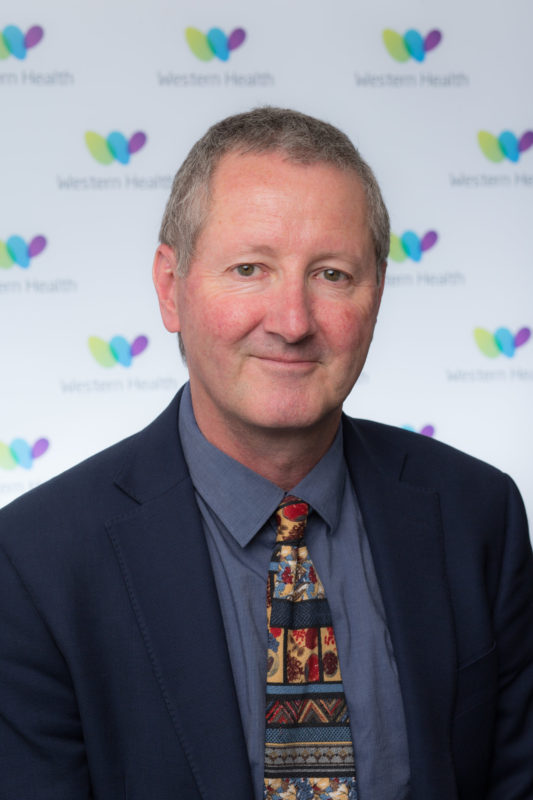
Western Health’s Tony McGillion (DONM Inspiring Innovation) has been successfully appointed as the Chair for the Australian College of Nursing (Melbourne Region) for a 2-year period.
He will lead a team including Deputy Chair, Communications Coordinator and Secretariat, an inspired group of individuals volunteering their time with an internationally-acknowledged professional Organisation.
The College vision is that of ‘shaping health, advancing nursing’ and seeks to keep members informed, connected and inspired. The College is a collective nursing voice that commands the recognition that the profession deserves, advocates for nursing at state and federal levels, actively partners with the International Council of Nurses (ICN), actively debates at policy level, encourages, educates and supports nurses to be active leaders within the profession and beyond. The role of the Melbourne region is to facilitate discussions on regional and state issues related to health and nursing and provide local networking opportunities
Congratulations on your appointment Tony!
EMR Phase 2.1 Milestone

The EMR Phase 2.1 project is nearing an important milestone, with the twelve month Design, Build and Validate phase set to conclude next month.
As the project prepares to move into a new phase, the high participation of Nurses and Midwives in the recently launched EMR Change Champion Network has been warmly welcomed by the EMR Phase 2.1 project team.
Nurses and Midwives make up 159 of the 249 staff who have joined the Network, which aims to promote and encourage an understanding of the EMR Phase 2.1 change, and to embed advocates across the organisation.
The EMR Change Champion Network held their first two briefing sessions, giving staff a better understanding of what will be implemented across the organisation as part of the EMR Phase 2.1 project and upskilling the network members on change management tools and techniques.
Any Nurses or Midwives still interested in joining the EMR Change Champion Network can find out more here.
The results of the recent EMR Phase 2.1 survey –which ran over the first three months of the year- have also been released, and it was fantastic to see so many Nurses and Midwives contributing.
More than 70% of the 548 responses to the survey came from Nursing and Midwifery staff across our EMR sites, with the results of the survey to help inform change, communication and training activities in the build up to Go-Live.
The full results of the EMR Phase 2.1 survey will be published shortly.
For more information on EMR Phase 2.1, please visit the Digital Health information site.
New standard for Opioid Analgesic Stewardship in Acute Pain

Each year more than 2.5 million people undergo surgery in public and private hospitals, some of whom may become persistent users of opioid analgesics after being treated for acute pain.
A new standard of care for opioid analgesics released today provides guidance for safe and effective opioid prescribing for acute pain, while reducing the risk of prolonged opioid analgesic use which can be harmful to patients.
The Opioid Analgesic Stewardship in Acute Pain Clinical Care Standard developed by the Australian Commission on Safety and Quality in Health Care sets out appropriate use of opioid analgesics in the emergency department and after surgery. It excludes major trauma and does not address the use of opioids to treat chronic pain.
Celebrating our diversity on IDAHOBIT
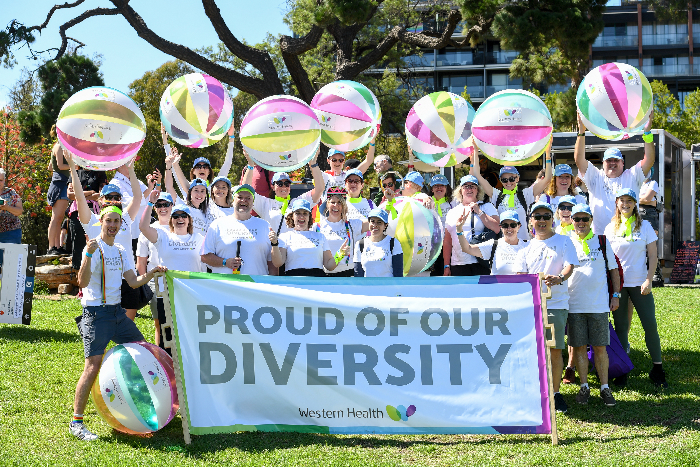
The International Day Against Homophobia, Biphobia and Transphobia (IDAHOBIT) is held annually on May 17 and aims to coordinate international events that raise awareness of LGBTQIA+ rights violations and is a day for the whole community to stand against LGBTQIA+ discrimination.
It is hard to believe that it is only 31 years ago on this day that the World Health Organization removed homosexuality from the Classification of Diseases and Related Health Problems!
At Western Health we are proud of our diversity and our inclusive culture – what will you and your team do on May 17 to show your support?
Including your pronouns in your signature block is a small but meaningful gesture. For those wanting to really show their support, why not incorporate a bit of rainbow into your day.
A reminder that we have the Employee Positive Workplace Issue Resolution (EMPOWIR) tool available for all staff to access advice and support.
Emerging Evidence
The Western Health Library Service is a great source for locating the latest nursing and midwifery related evidence based practice and research. The links below work best with Microsoft Edge or Chrome.
Articles of interest:
- We’re on mute! Exclusion of nurses’ voices in national decisions and responses to COVID-19: An international perspective. Journal of Advanced Nursing 2022: April. Full Text Western Health Author
- Evaluation of a new lactation device ‘Lactamo’ designed to apply massage, heat or cold, and compression to the breast. International Breastfeeding Journal. 2022: Mar. Full Text Western Health Author
- Hospital clinicians’ psychosocial well-being during the COVID-19 pandemic: longitudinal study. Occupational Medicine (Oxford, England). 2022: April. PubMed Link. Request copy of article Western Health Author
- Women’s experiences of pregnancy and lactation after bariatric surgery: A scoping review. Midwifery. 2022: April. Full Text Western Health Author
- Effectiveness of patient education on total knee arthroplasty: A systematic review and meta-analysis. Journal of Clinical Nursing. 2022: April. Full Text
- Family involvement in caring for inpatients in acute care hospital settings: A systematic review of literature. Sage Open Nursing. 2022: April. Full Text
- Impact of sepsis education for healthcare professionals and students on learning and patient outcomes: a systematic review. The Journal of Hospital Infection. 2022: April. Full Text
- Instruction strategies for drug calculation skills: A systematic review of the literature. Nurse Education Today. 2022: April. Full Text
- Family-centred care interventions to reduce the delirium prevalence in critically ill patients: A systematic review and meta-analysis. Nursing Open. 2022: April. Full Text
- Fall prevention in hospitals and nursing homes: Clinical practice guideline. World Views on Evidence-Based Nursing. 2022: April. Full Text
New Nursing/Midwifery eBook Titles
- Care of the acutely ill adult: an essential Guide for Nurses. 2nd ed. Oxford: Oxford University Press, 2020.
The new edition of this book enables nursing staff to develop an in-depth understanding of the knowledge required to care for patients whose condition is deteriorating. The book emphasizes the importance of systematic assessment, interpretation of clinical signs of deterioration, and the need to escalate the patient in a timely manner. Current evidence-based practice and up-to-date guidelines are included in each systems-based chapter and case studies are used throughout the book to enable nurses to apply knowledge to patient scenarios - Point-of-Care Resource – UpToDate
Point of Care (POC) resources or products are searchable databases that provide a summary (or synthesis) of current evidence for specific conditions or treatments. - UpToDate (On-site at WH) is an evidence-based, physician-authored clinical decision support resource which clinicians trust to make the right point-of-care decisions. Take a look at A Nurses’ Guide to Using UpToDate. (Best with Edge or Chrome)
Off-site or home access to the library eBook titles, require free library membership. If you are not a member you can Join Online. For more information Click on our FAQ page.
Visit the library’s Intranet website, or ring the library to speak with a Librarian: 8395 8036 or 8345 6655. Working from home? Visit the Library Internet site.

